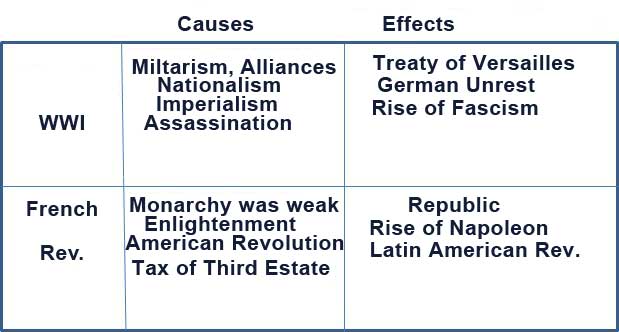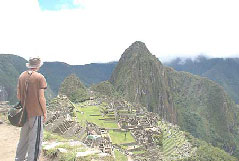|
|
|
| Global Regents Thematic and DBQ Essay Help - How to Write Them! | |
|
|
|
|
THEMATIC ESSAY ... Scariest Part CLICK HERE FOR MR. KLAFF'S SUMMARY OF GLOBAL THEMATICS AND DBQs SINCE 2001
NOW FOR SOME THEMATIC TIPS. NOTE: The Thematic and DBQ Essays are graded on a scale of 1 (lowest) to 5 (highest).
Tip #1: Depth and Analysis Do you remember when someone in your past told you that "it's not quantity, it's quality"? They lied. It's both which you need. You could answer a thematic essay in two sentences and be sort of correct ... but that doesn't mean you will get a good grade! You need to offer details ... DETAILS!!! Let's assume you have the following part of a question: Explain how 1 geographic feature impacted a region. Well, you could answer it one of two ways: a) "The rivers of Mesopotamia led to farming and trade. Civilizations thrived." Wow, two sentences. One of those was two words long!! That's not ANALYSIS. You need to analyze, or in simpler terms ... you need to make a detailed examination using plenty of relevant facts. Maybe you are better off saying: b) "The fertile crescent of Mesopotamia was between the Tigris and Euphrates rivers. The rivers led to a great amount of fertile soil, as civilizations such as Sumer and Babylon began to thrive c1800 BC. Sumer even had writing on clay tablets known as cuneiform. As for Babylon, King Hammurabi had a code of laws which applied to everyone, though it punished people different depending on class. Great trade also took place because of the rivers, as seafaring people such as the Phoenicians helped to connect cultures from Mesopotamia to elsewhere in the Mediterranean Sea. Do you see the difference there? Both are correct, but (b) is SO MUCH BETTER! It offers specifics, history, and context. Tip #2: Choose what you can write a lot about! I know it sounds obvious, but you really need to write about a topic you know very well. After the question, the Regents will offer you different options as to what you can write about (though you are not limited to their choices). For instance, if the essay is on "Revolutions," then choose what you can write the most on. To me, I would think you could write much more on the Industrial Revolution than the Neolithic Revolution. Don't choose something that you can only write a few sentences about!
Tip #3: Answer every bullet equally! The question will give you 2-3 bullets to answer. If you write 10 pages on one bullet, and nothing on the others ... that's bad! Don't forget to answer every part. Let's say you get a question that says Choose two belief systems: - Describe two beliefs regarding that system. - Discuss how the belief system affected world history. Notice, they are asking you 6 things in total! For this type of question make the following grid:
This type of grid will ensure that you won't miss or mix up a question. Now that you are organized, you can write the essay with EVEN MORE details! Tip #4: Be Careful! NOTE: You CAN NOT write about US History. For crying out loud!! Martin Luther was NOT Martin Luther King, Jr. Also, the thematic sometimes says ... "You can not write on certain topics." Topics in the DBQ are usually off limits for the thematic essay. Make sure you read the bold words under the question!
Tip #5: What to Study? The thematic is scary ... but not scary if you study the right things. KNOW THE FOLLOWING SIX THINGS, AND YOU HAVE A GREAT CHANCE OF KNOCKING THIS OUT OF THE PARK. Historically, the following are the topics found most often on thematics. 1. I would know 2 religions (belief systems) VERY WELL ... Islam, Hinduism, Buddhism, etc ... (Religion Flashcards ... Religion Review Song) Religion could also be under a larger theme of cultures and their contributions. So Greece, Rome, or Ancient China could work in that case.
3. I would know two Revolutions REALLY WELL. Go French Revolution ... or Russian ... Peace, Land, and Bread! Studying both would cover you for the Political Systems of Absolutism (overthrow of) and Communism! Also, know a non-political one such as the Industrial or Neolithic Revolution! By studying Industrial, you are covered for the Economic Systems of capitalism and socialism. A revolution is GREAT for the Thematic, because it can be used for: Change, Conflict, War, or Turning Points. The Regents has asked that type of question often in recent years. 4. Human Rights Violations -- Study 2 of these very thoroughly: Holocaust, Khmer Rouge, Tiananmen Square, Apartheid. 5. Know a few individuals REALLY well. Pick two who are seen in a favorable light, and two who aren't. Scroll down on this sheet for a list of the major people of the course. When in doubt, Gandhi and Locke are easy to write about. 6. A pretty easy topic to write about is technology. But remember: WRITE ABOUT A TOPIC THAT YOU CAN DISCUSS IN DEPTH. The atomic bomb, Sputnik, or gunpowder are topics that fit this theme. Other choices include the astrolabe, aqueducts, and the printing press. Low Percentage Thematics include: Economic and Political Systems (mentioned above), Movements of People and Trade Organizations (Silk Roads, Gold-Salt trade, OPEC, NAFTA), Collapse of Governments (Fall of Rome & Soviet Union), Nationalism (WWI and WWII), and Global problems such as pollution and deforestation. BUT IT REALLY COULD BE ANYTHING! See the entire list of the thematic history by clicking the link above. Tip #6: How many Paragraphs?!?!!? Students are always scared about how many paragraphs they should write. Well ... according to the state standard you need to do the following: Have a logical and clear plan of organization. Also, have an introduction and conclusion that doesn't just restate the theme. Hmmm ... it doesn't say how many paragraphs to write! The number of paragraphs is usually determined by the amount of bullets in the question. But usually, if they ask for two religions as shown above, a body paragraph for each religion will do. Suppose you have SO MUCH information on both ... then you can write 4 body paragraphs. That's a paragraph per religion for each bullet (or square on the above chart). Does that mean you can't get a good grade with 2 body paragarphs? It doesn't mean that! According to the state standard, you can get a 5 if you have very good organization, you analyze and answer all parts thoroughly, and include a lot of facts, examples, and details. Perhaps, you can even create new information based upon your knowledge.
DBQ Your Score on the DBQ will be
largely based on you answering “yes” to the following questions: 1. Did I put the documents into proper groups and analyze them? (DO NOT SUMMARIZE) 2. Did I use the MINIMUM amount of documents
which they suggest? 3. Did I answer the bullets SPECIFICALLY as to what is asked? 4. Do I have a detailed thesis? 5. Is my
outside information
impressive?
NOW FOR SOME TIPS.
Tip #1: First, the Scaffolding Questions
Do you know how important those little questions are after the documents? They are worth BIG points. They count the same as multiple choice questions. So, make sure you TAKE YOUR TIME with them. I know, it's hot outside and you want to go swimming. The pool can wait! If you see 2 lines, write 3 lines! Answer in full sentences. Give all you know! My recommendation would be to first scan the document. Notice who is speaking, what the year is, and the focus of the document. Then, read the question so you know specifically what is being asked.
Tip #2: Organize They will give you a few sets of documents. Usually there's about three topics in a general category such as human rights violations, change, turning points, or technology. Organize the documents by topic so you know which ones will fit in the same paragraph when you write.
Tip #3: Outside Information Use extensive outside information. No Bull, you need to have a lot of outside information. As you go through each document, jot down notes in the margins. Your documents should be drowning in ink by the end of the hour! Give anything...ANYTHING...relevant that is not in the documents. For example, consider a document that deals with John Locke. In the margin write down “Enlightenment,” “Rousseau, Montesquieu, Voltaire’.” Any note about thinkers of that era would be a great addition of outside information. Cite your Outside Information (O.I.) as well as your documents (Doc 1) (Doc 2). Be warned ... your teachers are pretty smart! Don't write down ... Russia is big and cold. (O.I.) That's not the outside info we are looking for!
Tip #4: DON'T SUMMARIZE! Discuss, Describe, Explain. If you just copy over the documents, you'll have a really long and TERRIBLE essay. The documents are there to guide your argument. If they are asking about the changes brought on by the Scientific Revolution, and you just summarize the Heliocentric Model without focusing on the question, you are NOT doing it correctly! If they say: Describe - It means to tell about it. Discuss - It means to make observations using reasoning and present detail. Explain - It means to make understandable and provide reasons, causes, or results. If they ask to Discuss change, then show that you understand how the heliocentric model brought about change and why it can be considered a turning point. Thus: The heliocentric model of Nicolaus Copernicus was an important contribution of the Scientific Revolution of the sixteenth century. The model illustrated that the Sun was the center of the solar system and the planets revolved around it. This was great change, as for centuries people believed in the geocentric model whereby the Earth was the center of the universe. Galileo looked to prove the heliocentric theory by using a telescope to observe the moons of Jupiter. The Church didn't take kindly to Galileo's work. He was convicted of heresy and forced to live under house arrest. Still, the Scientific Revolution was a turning point as scientists continued to question ancient teachings from those such as Aristotle. A new era of scientific observation and experimentation took over Europe. The biggest piece of advice I can give is to answer their questions with analysis (or detailed examination). If you just summarize documents without focus, the essay will be in big trouble!
Tip #5: How many Paragraphs?!?!!? TO REPEAT FROM ABOVE IF YOU'RE TOO LAZY TO SCROLL BACK UP: Students are always scared about how many paragraphs they should write. Well ... according to the state standard you need to do the following: Have a logical and clear plan of organization. Also, have an introduction and conclusion that doesn't just restate the theme. Hmmm ... it doesn't say how many paragraphs to write! The number of paragraphs is usually determined by the amount of bullets in the question. But usually, if they ask for two religions as shown above, a body paragraph for each religion will do. Suppose you have SO MUCH information on both ... then you can write 4 body paragraphs. That's a paragraph per religion for each bullet (or square on the above chart). Does that mean you can't get a good grade with 2 body paragraphs? It doesn't mean that! According to the state standard, you can get a 5 if you have very good organization, you analyze and answer all parts thoroughly, and include a lot of facts, examples, and details. Perhaps, you can even create new information based upon your knowledge.
|
|
 |
|
 |
 |
 |

|
 |




 2. I would know a couple
of the impacts of
2. I would know a couple
of the impacts of